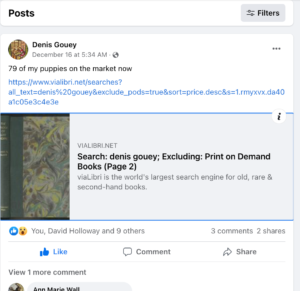
Something new will be coming soon to viaLibri.
As we all know, one of the unexpected side effects of the recent pandemic was the wave of Virtual Book Fairs arriving in its wake. These were a logical and welcome response to the vacuum that resulted when lockdowns had suddenly erased physical book fairs from the calendars of bibliophiles everywhere.
It seemed obvious to me that a new online bibliophilic marketplace was in the process of being created and, in particular, that viaLibri was in a unique position to host and support it. The benefits and opportunities, for both consumers and vendors, were compelling.
They could not be ignored.
We set to work immediately designing and building our own online platform for virtual bookselling. We wanted something more than just another internet book fair. We wanted something that would fully leverage the power of the internet to provide an online marketplace focused specifically on the needs of bibliophiles, whether buyers or sellers. We wanted something that would be more than just a digital facsimile of a traditional book fair. What we wanted was a Virtual Showcase for old and rare books, enhanced with tools that will, we believe, enable serious collection building in new and exciting ways.
As ever with projects like this, it has taken us much longer than we had planned. New possibilities continued to present themselves. Our vision of what the future of online bookselling could become quickly expanded as we went forward. But a finish line is now in sight.
We are currently completing the final touches before the official launch and we’d like to invite you to join our new viaLibri mailing list, which we have launched today. It will keep you informed of future plans as they are announced.
If you are curious to read some of our previous blog posts regarding this subject you can find them here:
Our thoughts on virtual book fairs
 added to the count and began including books and ephemera from Getman’s Virtual Book Fairs – the oldest, largest and best known virtual book fair platform.
added to the count and began including books and ephemera from Getman’s Virtual Book Fairs – the oldest, largest and best known virtual book fair platform.
 It was formed in 2005 by the Asociación Profesional del Libro y Coleccionismo Antiguos with members from nearly all the Autonomous Communities of Spain. It operates as a non-profit association owned and controlled exclusively by its members.
It was formed in 2005 by the Asociación Profesional del Libro y Coleccionismo Antiguos with members from nearly all the Autonomous Communities of Spain. It operates as a non-profit association owned and controlled exclusively by its members. well-known bookbinder from Connecticut. Naturally, he is interested in promoting his skills on the internet. You can find him on Facebook where, on Friday, he published a post that links to a viaLibri search result listing all the books on viaLibri that match on the keyword “Denis Gouey”. As a result, anyone visiting him on facebook can click on this link and see pictures of lots of books bound by him and currently for sale online.
well-known bookbinder from Connecticut. Naturally, he is interested in promoting his skills on the internet. You can find him on Facebook where, on Friday, he published a post that links to a viaLibri search result listing all the books on viaLibri that match on the keyword “Denis Gouey”. As a result, anyone visiting him on facebook can click on this link and see pictures of lots of books bound by him and currently for sale online.
 We are happy to announce that following another month of continued growth we are looking to expand our technical staff. We’re searching for a full stack developer who wants to work remotely. If you think you might be interested in joining us please check our our latest job announcement, recently posted here:
We are happy to announce that following another month of continued growth we are looking to expand our technical staff. We’re searching for a full stack developer who wants to work remotely. If you think you might be interested in joining us please check our our latest job announcement, recently posted here: